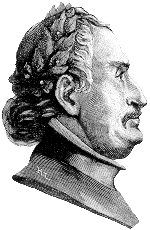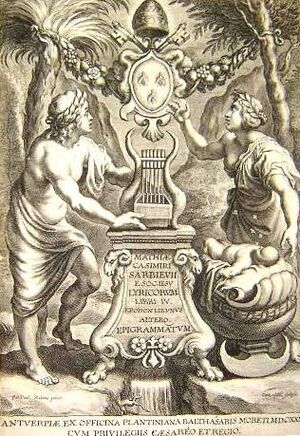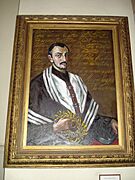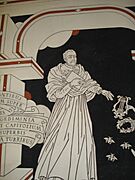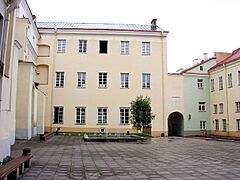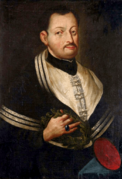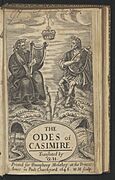Maciej Kazimierz Sarbiewski facts for kids
Quick facts for kids
Maciej Kazimierz Sarbiewski
|
|
|---|---|
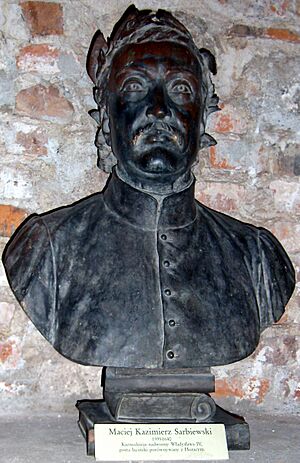
Bust of Maciej Kazimierz Sarbiewski by Jan Kryński. Before 1885
|
|
| Born | 24 February 1595 Sarbiewo, Masovian Voivodeship |
| Died | 2 April 1640 Warsaw |
| Resting place | Powązki Cemetery |
| Alma mater | |
| Occupation | Poet, writer, university teacher |
| Employer | |
| Movement | Baroque |
Maciej Kazimierz Sarbiewski (born February 24, 1595, died April 2, 1640) was a famous Polish poet and writer. He was known throughout Europe in the 17th century for his poems written in Latin. He was also an important thinker about how poetry works.
Contents
Life of a Poet
Maciej Kazimierz Sarbiewski was born in a place called Sarbiewo in Poland. This was on February 24, 1595. When he was 17, he joined the Jesuits in Vilnius. The Jesuits are a religious order of priests and brothers.
His Education and Early Career
Sarbiewski studied many subjects, including rhetoric (the art of speaking and writing well) and philosophy (the study of knowledge and existence). He taught these subjects to others from 1617 to 1620. Later, he studied theology, which is the study of religious faith. In 1622, he went to Rome to finish his theology studies. He became a priest there in 1623.
Some people believe that Pope Urban VIII himself honored Sarbiewski for his amazing poetry. This honor was called "Papal poet laureate," meaning he was officially recognized as a top poet by the Pope.
Return to Poland and Royal Connections
After his time in Rome, Sarbiewski came back to Poland. He taught at Vilnius University from 1626 to 1635. He taught rhetoric, philosophy, and theology. Later, he became a preacher for King Władysław IV Vasa. He even traveled with the King for four years.
Sarbiewski's Poetic Style
Sarbiewski was a very talented person. He was good at music and fine arts, but his greatest skill was poetry. He knew the works of ancient poets like Horace and Pindar very well. He especially loved Horace's Odes and knew them by heart. He used their styles to create his own beautiful poems.
His poems often focused on deep thoughts and strong feelings. He wrote about his love for Christ and Mary. He also wrote poems for important people who supported him, like Bishop Łubieński and Cardinal Francesco Barberini. Cardinal Barberini was the nephew of Pope Urban VIII, who was a big supporter of Sarbiewski's work.
Patriotic and Nature Poems
Sarbiewski also wrote powerful poems about his home country, Poland. These were called patriotic odes. He also wrote gentle poems about nature, like the rose, the violet, and the grasshopper. These poems showed his delicate touch and skill.
King Władysław IV Vasa crowned him poeta laureatus, which means "poet laureate." This was a special title for a great poet. Pope Urban VIII also asked him to help improve the hymns (songs) used in the Breviary, a book of prayers. Sarbiewski helped make these hymns sound smoother and more musical.
His Famous Works
Maciej Kazimierz Sarbiewski was the first Polish poet to become famous all over the world. He was one of the most popular Polish writers before Henryk Sienkiewicz. People called him Horationis par, meaning "the equal of Horace". They also called him "the Sarmatian Horace" and "the last Latin poet." "Sarmatian" refers to a historical region connected to Poland.
His Poetry Collections
His first collection of poems, Lyricorum libri tres (Three Books of Lyrics), made him famous in Europe. An even bigger version, Lyricorum libri IV (Four Books of Lyrics), was incredibly popular. It was printed in 60 different editions in many countries!
Translations of His Work
Many of Sarbiewski's poems have been translated from their original Latin into other languages. In Polish, there are more than 20 different translations of his poems. The most complete Polish translation was done by Ludwik Kondratowicz.
His poetry was also very popular in Great Britain. Many of his poems were translated into English. There are at least four full English translations of his work. In recent years, new collections of his English translations have been published, showing his lasting importance.
Other Writings
Besides his famous poetry, Sarbiewski also wrote prose works. Some of these include:
- De acuto et arguto liber unicus, sive Seneca et Martialis (a book about sharp and witty writing)
- Dii gentium (a book about ancient arts and sciences)
- De perfecta poesi libri quattuor (four books about perfect poetry)
- De Deo uno et trino tractatus (a religious text)
- De angelis (a book about angels)
- De physico continuo (a scientific text)
- Memorabilia (a collection of memorable things)
- Various speeches, sermons, and letters.
Gallery
-
Sarbiewski portrait at the Church of St. Johns in Vilnius (by Sofija Veiverytė)
See also
- List of Poles
- History of the concept of creativity
 | William Lucy |
 | Charles Hayes |
 | Cleveland Robinson |


